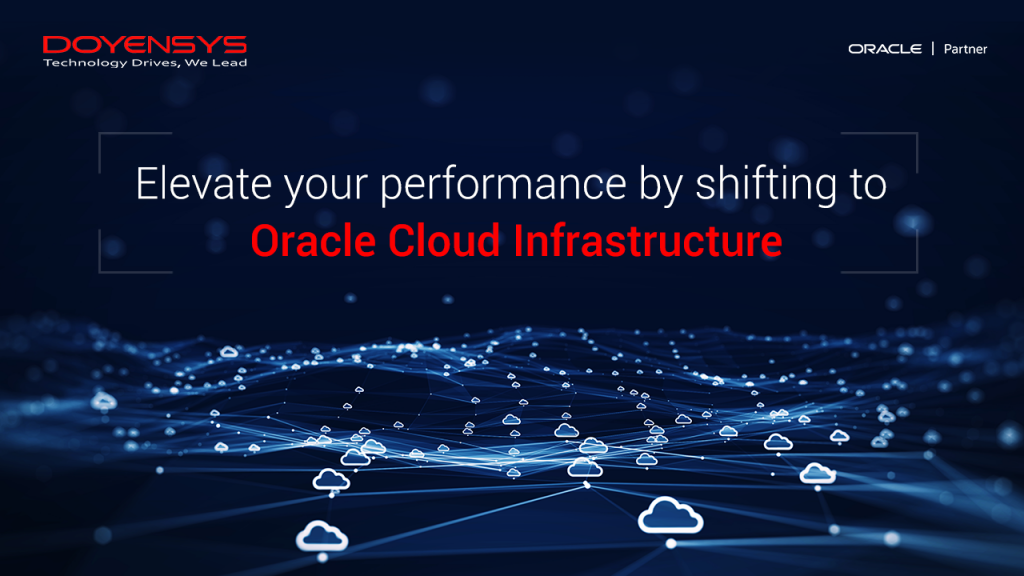Increased technical performance is one of the many advantages of moving to the cloud, and it supports both business and operational growth. Since its conception, cloud computing has progressed at a dizzying rate. As a result, some cloud providers have patched together old systems to satisfy new demands to keep up.
As a result, fragmentary cloud systems lack the consistency required to unlock data’s potential completely & struggle to serve massive, enterprise-scale solutions with huge data volumes and high-performance requirements.
These cloud systems usually have heavy workloads and hardware and software that aren’t designed to function together, resulting in reduced processing capacity, trouble managing back-office systems, and dissatisfaction.
Moving to the cloud shouldn’t slow you down by posing logistical obstacles; instead, it should deliver smooth, highly scalable performance and actionable information, allowing you to make faster, growth-generating decisions at scale.
Oracle Cloud Infrastructure (OCI) was created to improve performance by adding value to the business and streamlining operations. Both are linked by OCI’s capacity to process and manage data seamlessly, ensuring that the correct data is delivered to the correct location.
Oracle Cloud Infrastructure (OCI) combines infrastructure as a service (IaaS), platform as a service (PaaS), software as a service (SaaS), and data as a service (DaaS) into a single platform. Oracle’s Open Cloud Infrastructure (OCI) brings together a range of low-cost computing, storage, database, networking, and platform services aimed at businesses of all sizes, including small and medium-sized businesses.
 OCI is designed for mission-critical applications:
OCI is designed for mission-critical applications:
While a few cloud platforms are designed to enable edge applications as a general-purpose cloud, Oracle built OCI particularly to handle business-critical workloads. The OCI foundation is where Oracle’s commitment to business-criticality begins.
OCI has a flat architecture, allowing data to move via a single layer more quickly than several components. In addition, physical servers do not handle network virtualization or cloud software; instead, distinct isolated systems are used. As a result, your apps can run faster & your data will be more secure.
When considering a cloud migration, there are numerous factors to consider. For example, a common client issue is SLAs being left hanging due to unanticipated outages or service unavailability. However, clients may rest easy knowing that OCI is the only cloud service provider in the industry to provide performance SLAs backed by monetary compensation.
But it’s not only about loudness, transitional ease, or dependability. For example, inserting 500 million rows of data backed by OCI takes less than three minutes on average, a 1.6x performance gain and a 14x performance acceleration over published findings.
Thanks to Oracle’s Autonomous Database on designed systems, things became achievable. In addition, the higher Performance of Oracle-engineered systems allows teams to focus on growth by unlocking more value than resolving infrastructure concerns.
OCI also provides High-Performance Computing (HPC) Solutions for corporate customers who have largely depended on on-premises systems with high capital expenses. OCI improves performance by allowing vast volumes of data to be processed more quickly, cheaply, and with greater security.
The advantages are immediate: complicated computations can be completed in minutes rather than weeks. There is a standalone source of truth for all systems & the insights predicated on more reliable data. Businesses can make better decisions as a result of this.
Reducing the time taken to accomplish activities allows the company to take on more business-building ventures. The increased productivity boosts the bottom line while also providing clients with unmatched flexibility.
Oracle adds key performance capabilities across industries:
Most prominent cloud providers got fast servers on which they overlay software, implying they are not truly harmonized. As a result, the ordinary supplier lacks the processing capacity required to keep huge back-office systems running. That’s why major companies that process over 10 million customer invoices overnight.
For example, it requires time to rerun if something goes wrong. It is where Oracle Exadata Cloud Service (ExaCS), a database computing platform made up of fully optimized hardware and software for running Oracle databases, comes in handy. As a result, Oracle Exadata provides customers with greater availability, excellent performance, and significant cost savings.
ExaCS would provide the scalability and functionalities required by businesses processing hundreds of millions of operations in a short period. The Oracle solution functions and provides the same performance and functionality deployed in the cloud or the customer’s data center.
Many Fortune 500 businesses turn to OCI for dependability and scalability without sacrificing their SLAs when dealing with mission-critical data in large volumes. Because it supports sophisticated database solutions for increased scalability and availability, OCI is a pioneer in improving performance.
Organizations can now safely and securely shift to the cloud while gaining immediate value because of OCI’s excellent performance. As a result, they not only adjust quickly to changing client demand and market situations but also expand their operations without risking downtime.
All cloud systems are not created equal. However, by offering a degree of performance that enables enterprises to accomplish speed to value while leaving infrastructure difficulties to their cloud provider, OCI is preventing problems. In addition, your company doesn’t have to rely on a single vendor with Oracle Cloud Infrastructure.
OCI has cross-cloud integration capabilities, allowing it to work with Microsoft and other cloud providers. In addition, because OCI ensures interoperability through standards compliance, you can run both Oracle and non-Oracle workloads on it, or solely the latter.
It also supports open-source technologies and is language-agnostic, allowing it to interface with DevOps and IT solutions from various vendors & runs on Windows and Linux servers. In addition, Oracle offers assistance from its expertise to enterprises that need help transitioning to the cloud via Oracle Cloud Infrastructure.
Final Thoughts:
Oracle’s cloud capabilities can help your company perform better. Contact Doyensys Oracle Platform to learn more about Oracle Solutions or if you want to learn more about your alternatives for elevated, secure, scalable, and reliable cloud infrastructure built for enterprise application purposes.

